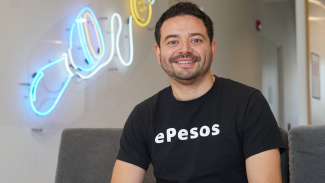Ariel Olaiz, BBA ’07: Expanding Economic Inclusion in Mexico with Fintech Startup ePesos

Ariel Olaiz, BBA ’07, has come full circle — from studying business at the base of the pyramid at the Ross School of Business to fostering economic inclusion in Mexico as CFO of the fintech startup ePesos.
Based in Monterrey — an industrial hub nestled near the picturesque Sierra Madre Oriental mountains, a few hours south of Houston — ePesos is the first fintech venture of its kind in Mexico. The company allows employees to digitally access their wages before payday for a small fee, usually around $2.
In a nation where 80% of working adults make $750 or less per month, according to Olaiz, the service can be crucial to making it from paycheck to paycheck.
“Let’s say it’s the fifth of the month and you have to pay for school supplies for your kids,” Olaiz explains. “You don’t have any savings, so you need cash. You would advance part of your salary today to pay for the school supplies. Then, your company will deduct the amount that you advanced and a small commission to pay for that service, which is how we generate revenue.”
Employees can download the ePesos app to their smartphone or web browser and use it 24/7 to request an advance to their existing payroll debit card. The service features built-in consumer protections for employees that, along with its comparatively low cost, set ePesos apart from traditional payday lenders.
The service is attractive to employers because it costs them nothing, but they can offer it as an incentive to help curb employee attrition.
ePesos currently partners with approximately 150 companies to serve 40,000 workers on any given week. Olaiz says ePesos is growing its footprint in Mexico, where it currently operates in 16 out of the nation’s 32 states. In the future, ePesos may offer expanded services to help low-income employees save money and build credit.
“It’s not economical for banks and traditional financial institutions to give these financial services to people who have low incomes. So what we end up doing is using technology to bring the costs to serve these customers down,” Olaiz says. “That’s why fintech is booming in Latin America. When you start digitizing a lot of processes, you don’t have to have a network of branches across the entire country.”
Olaiz says his U-M education comes into play every day in his role as co-founder and chief financial officer at ePesos.
I work at a startup where, one day, I’m raising capital. Another day, I’m presenting to the board. Another day, I’m working on operations. Another day, I’m trying to optimize our sales funnel,” Olaiz says. “One of the very basic things that I got out of Ross was this toolkit that gave me confidence and frameworks to apply to these different areas of business.
After earning his bachelor of business administration degree at Ross, Olaiz went to work at New York-based asset manager BlackRock and earned an MBA from Harvard Business School in 2017. But, he credits Michigan Ross for sparking his passion for serving low-income customers — those at the base of the financial pyramid — in his native Mexico.
Base of the pyramid scholarship explores how businesses can pursue sustainable growth while helping to alleviate poverty in emerging markets.
“There’s a (U-M) faculty member who passed away (in 2010), C.K. Prahalad. He did a bunch of work on the base of the pyramid,” Olaiz says. “When I was in school, I took the business at the base of the pyramid course with (Arthur F. Thurnau Professor of Social Entrepreneurial Studies) Michael Gordon. It opened my eyes and it started me on the journey.
“It is very neat that it came full circle, now that I’m doing financial inclusion and working at a fintech. It’s kind of crazy,” Olaiz says. “There’s a lot of people who make very little. But, if you can offer (your product or service) to tens of thousands of people, then you can create a successful business.”







